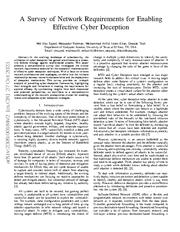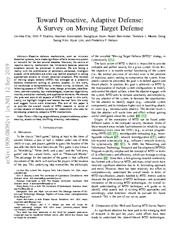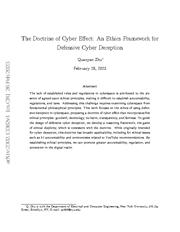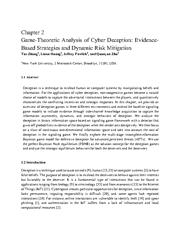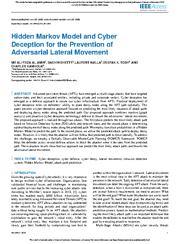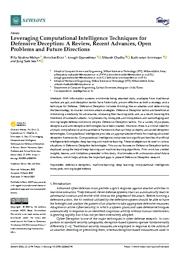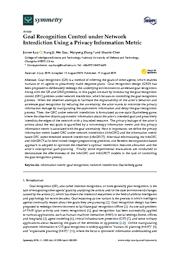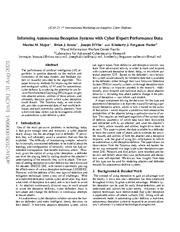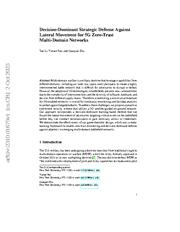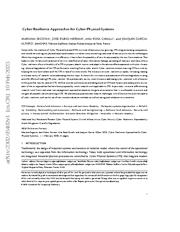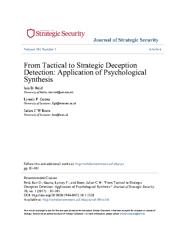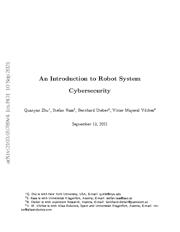A copy of this work was available on the public web and has been preserved in the Wayback Machine. The capture dates from 2020; you can also visit the original URL.
The file type is application/pdf.
Filters
Cyber Deception for Computer and Network Security: Survey and Challenges
[article]
2020
arXiv
pre-print
Cyber deception has recently received increasing attentions as a promising mechanism for proactive cyber defense. ...
Motivated by recent advances in cyber deception research, we in this paper provide a formal view of cyber deception, and review high-level deception schemes and actions. ...
The research focused on establishing a dynamic game with incomplete information, and employed deceptive equilibrium strategies for network defense. ...
arXiv:2007.14497v1
fatcat:fddyekpkprarfopmf3bzpuxsxi
A Survey of Network Requirements for Enabling Effective Cyber Deception
[article]
2024
arXiv
pre-print
By synthesizing insights from both theoretical and practical perspectives, we contribute to a comprehensive understanding of the network prerequisites crucial for enabling robust and adaptable cyber deception ...
This paper presents a comprehensive survey that investigates the crucial network requirements essential for the successful implementation of effective cyber deception techniques. ...
For instance, any security problem can be designed as a game between attacker and defender, consequently solving the game in terms of finding optimal strategies for players actually solves the security ...
arXiv:2309.00184v3
fatcat:aekdreuphfhgddatkimeqblh6u
Dynamic Hypergames for Synthesis of Deceptive Strategies with Temporal Logic Objectives
[article]
2020
arXiv
pre-print
Following the deceptive strategy, the agent chooses actions to influence the game history as well as to manipulate the adversary's perception so that it takes actions that benefit the goal of the agent ...
A hypergame is a hierarchy of games, perceived differently by the agent and its adversary. ...
Following the deceptive strategy, the agent chooses actions to influence the game history as well as to manipulate the adversary's perception so that it takes actions that benefit the goal of the agent ...
arXiv:2007.15726v1
fatcat:pl6kh7nz4jf47odj4sdfxsqley
Toward Proactive, Adaptive Defense: A Survey on Moving Target Defense
[article]
2019
arXiv
pre-print
Reactive defense mechanisms, such as intrusion detection systems, have made significant efforts to secure a system or network for the last several decades. ...
The concept of moving target defense (MTD) has emerged as a proactive defense mechanism aiming to prevent attacks. ...
Government is authorized to reproduce and distribute reprints for Government purposes notwithstanding any copyright notation here on. ...
arXiv:1909.08092v1
fatcat:wsycpvaqgzdcvboagxlbg5x6uu
The Doctrine of Cyber Effect: An Ethics Framework for Defensive Cyber Deception
[article]
2023
arXiv
pre-print
To guide the design of defensive cyber deception, we develop a reasoning framework, the game of ethical duplicity, which is consistent with the doctrine. ...
While originally intended for cyber deception, this doctrine has broader applicability, including for ethical issues such as AI accountability and controversies related to YouTube recommendations. ...
Game-theoretic frameworks, such as signaling games [30, 43] , Bayesian games [44, 45] , and dynamic games [15, 16] , have proven to be powerful tools for developing effective deception strategies in ...
arXiv:2302.13362v1
fatcat:h5hxgpthxngojjm5pavd6s6afy
Game-Theoretic Analysis of Cyber Deception: Evidence-Based Strategies and Dynamic Risk Mitigation
[article]
2019
arXiv
pre-print
Deception is a technique to mislead human or computer systems by manipulating beliefs and information. ...
For the applications of cyber deception, non-cooperative games become a natural choice of models to capture the adversarial interactions between the players and quantitatively characterizes the conflicting ...
[16] have considered a class of cyber deception techniques in the field of network security and studied the impact of the deception on attacker's beliefs using the quantitative framework of the game ...
arXiv:1902.03925v1
fatcat:setsnhv7ajfxvn6jadqedvfevy
Hidden Markov Model and Cyber Deception for the Prevention of Adversarial Lateral Movement
2021
IEEE Access
Cyber deception has emerged as a defense approach to secure our cyber infrastructure from APTs. ...
Our proposed approach combines reactive (graph analysis) and proactive (cyber deception technology) defense to thwart the adversaries' lateral movement. ...
Cyber deception has attracted attention from security researchers and practitioners as an approach for designing secure cyber infrastructure. ...
doi:10.1109/access.2021.3069105
fatcat:5rsprlywnbfy3ikvmxm4fpns4y
Leveraging Computational Intelligence Techniques for Defensive Deception: A Review, Recent Advances, Open Problems and Future Directions
2022
Sensors
For a variety of purposes, deceptive and anti-deceptive technologies have been created. ...
However, there is a critical need for a broad, comprehensive and quantitative framework that can help us deploy advanced deception technologies. ...
Combining a Deep Belief Network and a probabilistic neural network can result in a novel intrusion detection system that can be used to configure deception measures. ...
doi:10.3390/s22062194
pmid:35336373
pmcid:PMC8952217
fatcat:hgtvnjuzxfgudpa76fke433qhy
Goal Recognition Control under Network Interdiction Using a Privacy Information Metric
2019
Symmetry
Goal recognition (GR) is a method of inferring the goals of other agents, which enables humans or AI agents to proactively make response plans. ...
by manipulating the asymmetric information and delay the goal recognition process. ...
Network Interdiction In the defense and security domain, interdiction refers to actions that serve to block or otherwise inhibit an adversary's operations [36] . ...
doi:10.3390/sym11081059
fatcat:52sfcko3ojhfhlmvz2lkplkaee
Informing Autonomous Deception Systems with Cyber Expert Performance Data
[article]
2021
arXiv
pre-print
This paper discusses methods for improving the realism and ecological validity of AI used for autonomous cyber defense by exploring the potential to use Inverse Reinforcement Learning (IRL) to gain insight ...
The Tularosa study, as one example, provides experimental data of real-world techniques and tools commonly used by attackers, from which core data vectors can be leveraged to inform an autonomous cyber ...
Notable research evaluated different non-deceptive defense techniques against an active attacker in a cyber security simulation modeled as a Markov game with incomplete information. ...
arXiv:2109.00066v1
fatcat:to6ihgt6mvcmdo4tf6hv5qi6yq
Decision-Dominant Strategic Defense Against Lateral Movement for 5G Zero-Trust Multi-Domain Networks
[article]
2023
arXiv
pre-print
To address these challenges, we propose a proactive end-to-end security scheme that utilizes a 5G satellite-guided air-ground network. ...
We demonstrate the effectiveness of our game-theoretic design, which uses a meta-learning framework to enable zero-trust monitoring and decision-dominant defense against attackers in emerging multi-domain ...
These frameworks provide a structured approach to design and enforce robust security measures that align with the principles of zero trust, enhancing the overall resilience and protection of 5G networks ...
arXiv:2310.01675v1
fatcat:pb7qmtywmrbt7b7s6anqea4w3a
Deceptive Kernel Function on Observations of Discrete POMDP
[article]
2020
arXiv
pre-print
We introduce deceptive kernel function (the kernel) applied to agent's observations in a discrete POMDP. ...
This paper studies the deception applied on agent in a partially observable Markov decision process. ...
Horák et al. in [6] have adopted the model of one-sided partially observable stochastic game (POSG) and discussed the proactive deceptive actions by the defender as an approach to manipulate the adversary's ...
arXiv:2008.05585v1
fatcat:uyl3ryghuva5dfox3gfp2j7r6a
Cyber-Resilience Approaches for Cyber-Physical Systems
[article]
2023
arXiv
pre-print
We first provide preliminaries and background on CPS and threats, and subsequently survey state-of-the-art approaches that have been proposed by recent research work applicable to CPS. ...
CPS integrate sensing, computation, control and networking into physical objects and mission-critical services, connecting traditional infrastructure to internet technologies. ...
Acknowledgements -The authors thank the anonymous referees for their valuable comments and helpful suggestions. ...
arXiv:2302.05402v1
fatcat:kxa3npuv2fblrdmwpweqc4ca34
From Tactical to Strategic Deception Detection: Application of Psychological Synthesis
2017
Journal of Strategic Security
An illustration of how such an approach may work is provided through a scenario of a terrorist incident and how a tailored deception detection approach may seek to counter such a threat. ...
practitioner model for use in secure and community forensic settings. ...
is a requirement for a synthesis of approaches. ...
doi:10.5038/1944-0472.10.1.1528
fatcat:mqk544p2w5ca5ekafeqx2sr6by
Cybersecurity in Robotics: Challenges, Quantitative Modeling, and Practice
[article]
2021
arXiv
pre-print
A powerful quantitative approach to model-based security is offered by game theory, providing a rich spectrum of techniques to optimize security against various kinds of attacks. ...
This book aims to stipulate the inclusion of security in robotics from the earliest design phases onward and with a special focus on the cost-benefit tradeoff that can otherwise be an inhibitor for the ...
Acknowledgements The authors would like to thank the support that we receive from our institutions. We thank many of our friends and colleagues for their inputs and suggestions. ...
arXiv:2103.05789v4
fatcat:p3inkof6kbh3rds6jigvmq4doe
« Previous
Showing results 1 — 15 out of 107 results

